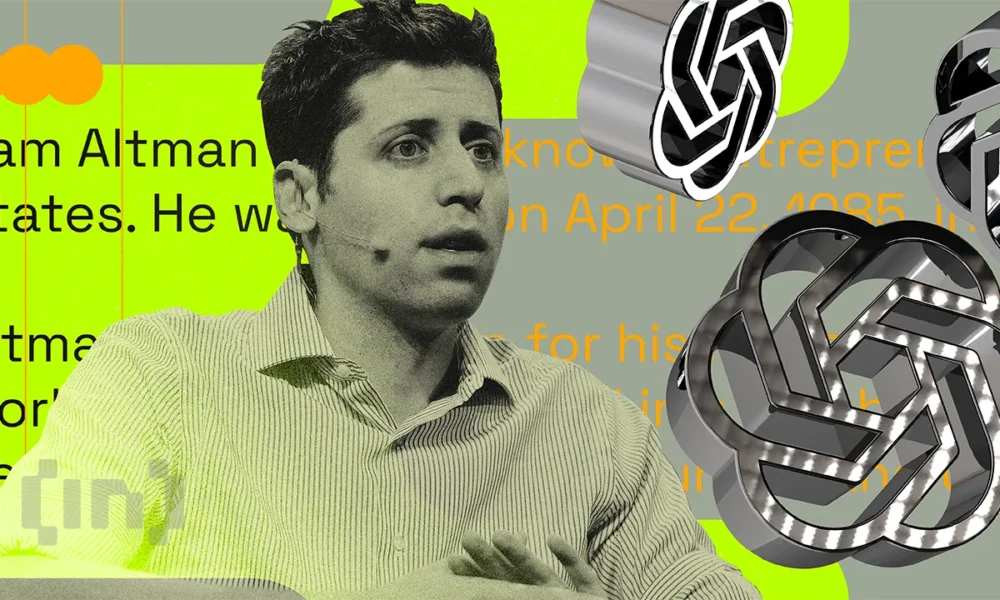Market
Fake Tokens and Phishing Attack

OpenAI’s official press account on X was compromised. The exploiter promoted a crypto scam on the platform targeting ChatGPT users.
The incident marks the fifth attack in less than two years, reflecting how hackers continue to plague the industry.
OpenAI Press Account Compromised for Fake Crypto Project
Reports of the attack first appeared on X around 10:26 p.m. UTC on Monday, suggesting that hackers had compromised the OpenAI Newsroom account. AI developer and Grok builder Benjamin De Raker confirmed the incident in a post.
“The official OpenAI Newsroom account has been hacked and is shilling fake shitcoins,” De Kraker wrote.
The hackers shilled fake “OPENAI” tokens on OpenAI’s press account. The bad actors advertised a suspicious phishing link for ChatGPT users, encouraging them to claim OPENAI, touted as a “bridge” between blockchain technology and AI.
Read more: Crypto Scam Projects: How To Spot Fake Tokens
The phishing link posted by the hackers redirected users to a website flagged with a “suspected phishing” warning. On this site, potential victims had the option to “learn more” or bypass the warning and proceed. To further deceive users, the hackers captioned their message with, “Comments turned off due to malicious links. Good luck, all!” — a tactic aimed at preventing warnings from being shared.
To entice victims, the fraudulent posts claimed that users could claim a portion of the fake OPENAI token’s initial supply. They misleadingly suggested this would grant access to the company’s upcoming beta programs, adding a false sense of exclusivity.

Neither OpenAI nor its CEO, Sam Altman, has publicly addressed the hack. They also did not respond to BeInCrypto’s request for comment regarding the incident. However, X has since removed the fraudulent posts promoting the phishing scam.
This breach follows another attack just a day earlier, targeting OpenAI researcher Jason Wei, further raising concerns about the security of high-profile accounts linked to the company.
“OpenAI has a real problem!! This is just two days after Jason Wei’s (researcher at OpenAI) account got hacked! Why haven’t they just told everyone at OpenAI to turn on 2FA for Twitter?! This keeps happening,” Medical AI Research Center CEO Tanishq Mathew Abraham said.
This recent incident adds to a growing list of hacks targeting OpenAI’s social media accounts, marking the fourth attack since June 2023. Previous breaches include a June 2024 attack on the account of lead scientist Jakub Pachocki and a June 2023 hack of CTO Mira Murati’s account. All these incidents were used to promote fraudulent OPENAI tokens.
While it remains unclear if the same hackers are responsible, the recurring theme of promoting fake tokens raises questions about the organization’s security measures. A separate July 2023 hack on OpenAI’s internal forum exposed sensitive employee data and communications, further intensifying concerns.
“It’s not hard to turn on 2fa, I don’t get how anyone even slightly knowledgeable about tech (everyone at OpenAI should meet this low barrier) could leave 2fa off,” one user commented.
Some attribute the vulnerabilities to X (formerly Twitter), referencing similar hacks on the accounts of companies like Apple and high-profile figures like Elon Musk, where hackers promoted Bitcoin scams.
Read more: Crypto Social Media Scams: How to Stay Safe
These breaches highlight the growing need for enhanced cybersecurity measures, as digital scams proliferate. In the past two years, victims have lost $79.1 billion to deep fake scams. The FBI also reported a sharp rise in crypto scams, with Americans losing $5.6 billion in 2023 — a 45% increase from the previous year.
With over 57,000 scams already reported in the first half of 2024, losses have approached $2.5 billion, indicating that this year could be just as devastating.
Disclaimer
In adherence to the Trust Project guidelines, BeInCrypto is committed to unbiased, transparent reporting. This news article aims to provide accurate, timely information. However, readers are advised to verify facts independently and consult with a professional before making any decisions based on this content. Please note that our Terms and Conditions, Privacy Policy, and Disclaimers have been updated.